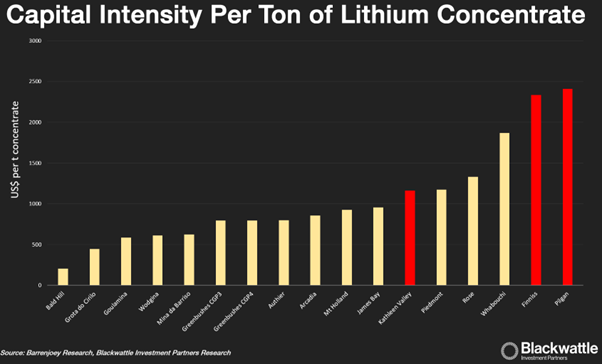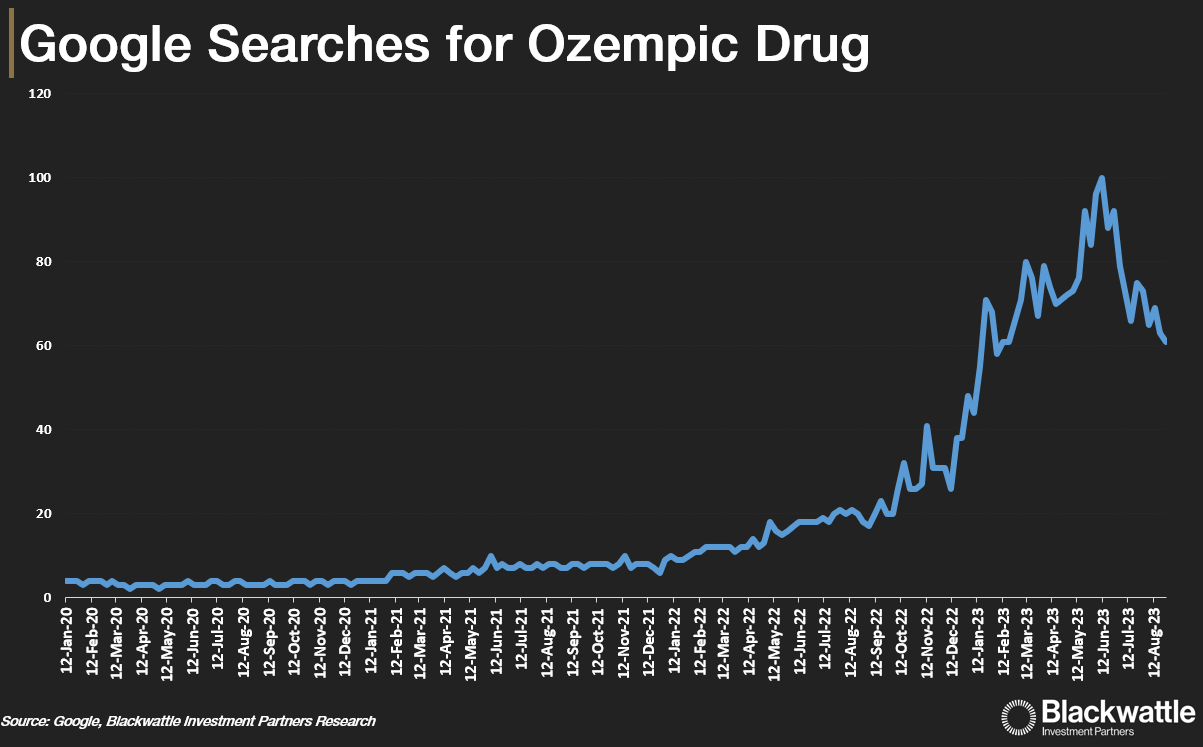Long and Short Opportunities within the ASX
During the August reporting season, Marvin Gaye’s, and Tammi Terrell's hit song, Ain't no Mountain High Enough, echoed in the hearts of many consumers. No mountain of household debt seemed sufficient to dissuade shoppers from reigning in their spending spree. From high-end sneakers flying off the shelves, as reported by Accent Group (AX1), to cheap discount thrills from Kmart (WES), the consumer was out in full force in the June half. This is despite the surge in living costs and 12 successive increases in the cash rate to 4.1% since April 2022.
Low expectations were met with better-than-feared results, leading the Consumer Discretionary index to outperform in August (+5.7). The strength of the consumer was evident with a chorus of retailers reporting encouraging sales growth in August, despite cycling the elevated "I'm free from lockdown" base in the prior period.
There were exceptions, namely in the household furniture and electronics categories; as consumers swapped plush leather couches with a flight to somewhere abroad, helping Flight Centre (FLT) report strong double-digit growth in transaction value in its outlook statement. Investors are now wondering if the consumer can keep climbing up this mountain of a tightening cycle and ride through to the next rate cut cycle, warranting the recent outperformance of consumer discretionary stocks.
At Blackwattle Investment Partners, our view is retailers are fragile businesses in the best of times, and the sales base (except for travel) is elevated relative to history. Given the current tightening cycle is the most aggressive since the mid-1980's, we expect pressure will build in the all-important December half, especially for discretionary household retailers. The lags of the fixed rate mortgage roll off have cushioned the impact of rising rates to date, however by December, mortgage payments as a percentage of income will hit a record high of 42%.

Reporting Season Insights
Corporate Australia reported earnings mostly in line with expectations, with only 31% of companies missing expectations (and about as many exceeding expectations). Operating margins have started to contract, as wages were the most significant headwind, partially offset by falling input prices. Lower freight, pulp, and energy costs helped several corporates offset slowing demand in the June quarter.
Interest cost burden increased to levels not seen since 2011, with the REIT sector hit the hardest given a limited ability to reduce costs and highly geared balance sheets. With a deteriorating outlook and geared balance sheet structures, the REIT sector could be prone to continued earnings weakness and reduced valuations if interest rates persist at current levels. The more time inflation spends above the cash rate, the more likely rates stay elevated. This is not a healthy mix for companies that are dependent on declining rates to create shareholder value.
Corporates with pricing power, such as Brambles (BXB), Carsales (CAR) and REA Group (REA) reported strong results, aided by mid-single to low double-digit price growth, well ahead of inflation. While double-digit price growth always raises the specter of incentivising increased competition, these businesses operate network models that are difficult to replicate, benefiting from high barriers to entry. The customers of these businesses are so dependent on the services provided, the only option they have is to pass on these price rises to their own customers.
In the case of Brambles, the value of the sunk pallet capital base on the balance sheet would now be below replacement cost, yet its cash ROCI of less than 10% is unlikely to attract new entrants. If anything, Bramble's sudden realisation of pricing power and increased discipline on pallet replacement should continue to improve shareholder returns after a decade of weak cash flow and returns. The plastic pallet experiment has all been sidelined, highlighting managements focus on shareholder returns.
Nothing is More Expensive than a Missed Opportunity
The cost to build anything, whether mining development, housing, or infrastructure, has skyrocketed since the pandemic. The implication is that incentive pricing and required returns to bring on new supply will be significantly higher than pre-Covid. Commodity prices are likely to be supported by rising cost curves and capital costs, and any mine or productive asset developed pre-Covid now has a capital advantage.
A case in point is, Mineral Resources’ (MIN) Wodgina Lithium project, which was completed for $610m ($800/t spodumene) in 2019. This now compares to Pilbara Minerals' (PLS) updated capital guidance for the P1000 expansion, which surprised the market by nearly 35%, implying over ~$2,000/t spodumene for expansion plans. Not deploying capital prior to Covid is now a missed opportunity.
The chart below highlights the increasing capital intensity per spodumene tonne of production, with red bars indicating capital budget increases in 2023.

The other "mountain high enough" facing miners is stricter environmental approvals. Alumina (AWC) reported that "timing is now uncertain" around approvals for its higher-grade Bauxite mine due to community angst around forest logging and potential contamination of drinking water. Consequentially, AWC is operating at a cash loss at current alumina prices, moving up the cost curve.
South32 (S32) relayed the same feedback, with existing mine permits taking up to three years to be approved for ongoing mining activity. The difference between South 32 and Alumina, is that South 32’s properties are not close to drinking water, and management at South 32 have a long history of navigating the complex regulatory permitting processes.
While permitting is becoming more uncertain, what is certain is higher capital and operating costs, and extended approval times.
This will mean supply growth in commodities will be more muted than the past, which is likely to lead to higher incentive commodity pricing, especially decarbonisation-related metals.
Can Artificial Intelligence Solve Rising Theft?
For Coles's (COL) shareholders, the company over-indexed to a rise in theft (+20%) and shrinkage, which impacted gross margin, falling short of market expectations. To us, rising theft is clearly the canary in the coal mine for a consumer under pressure, bolstering the case for weaker times ahead for the consumer.
To rectify theft, Coles is part way through rolling out Skip Scan (Artificial Intelligence and Camera Technology). Coles was one of the plethora of companies mentioning AI during result calls, however if Skip Scan is successful, then supermarkets could benefit from reduced stock loss costs.
This might not result in eye-watering revenue multiples for Coles as those being attached to Nvidia, but reduced costs do enable Coles to either reinvest back into market share or return cashflow to shareholders. To us, bankable cash earnings are more valuable than the lure of potential revenue growth. If Coles can address theft, then margins should improve given the stark difference now in gross margin between Coles and Woolworths.

One Person’s Trash is Another Person’s Treasure
Despite our sombre view on the consumer, Harvey Norman (HVN) now offers a compelling risk to reward proposition, as the valuation of the property holdings now exceeds the market capitalization. Our thesis is that if conditions deteriorate as Gerry Harvey is predicting, the property holdings will protect shareholders from a downturn, driving increased market share over the next decade. If conditions improve, then the market is likely to assign a substantially greater value to the operating business of Harvey Norman, leading to a much higher market price. This is the exact asymmetric payoff we look for at Blackwattle when investing on the long side.
There has also been much market debate around Resmed (RMD) after the stock sold off following a weak quarterly result. Share price weakness (-12%) persisted on concerns the number of patients with sleep apnea could diminish in the future given the rising popularity of weight loss drugs (such as Ozempic). While sleep apnea is linked to obesity (BMI>30), and 20% are likely to present with type 2 diabetes, the current payer coverage for weight loss drugs is approx. 30%-40%, and side effects do cause patients to drop usage.
The cost of the weight loss drugs is around US$12k per annum compared with less than US$300 pa for sleep apnea after initial setup. While Ozempic does lead to a 15-20% loss of weight, the need to be on weight loss drugs for life does make treatment cost prohibitive. Assuming some patients do drop out of treatment, coupled with a conservative incident rate assumption of c4% (AHI >15) for sleep apnea, we believe Resmed still has a large market runway for growth, and time will only tell if the market maybe over emphasising the impact weight loss drugs.

Outlook
You don't need to climb a mountain to know it's high enough. The same can be said for investing in quality businesses when the market is over-emphasizing a weak quarterly result, which may prove transitory. Reporting season is always volatile for share prices, as it's easy to get caught up in assuming the best- or worst-case scenario when prices are moving aggressively. In fact, this August reporting season was the most volatile since 2011, highlighting the short-term focus of market participants on earnings revisions.
Ultimately, company valuations are governed by their long-term cash flow and the duration of a business's return profile relative to the cost of capital. Our job is to find the companies where there is a mismatch between the market's perception of future cashflows and the multiple attached to those cashflows.
As per the examples outlined above, we continue to see opportunities across the ASX to put capital to work, especially after a volatile August reporting season.
Ray David & Joseph Koh
4 topics
5 stocks mentioned

